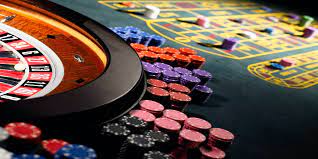Casinos have long been a cornerstone of entertainment, offering a mix of thrill, suspense, and opportunity. While many associate them with high stakes gambling and glamorous lifestyles, the truth is that pucuk138 are far more than just places to wager money. They represent complex ecosystems, blending luck, strategy, economics, and entertainment. This article explores the allure and multifaceted nature of casinos, shedding light on their evolution, gaming dynamics, and the psychology behind why people flock to these vibrant hubs of excitement.
The Evolution of Casinos
The origins of casinos can be traced back to ancient times, with games of chance and skill forming part of various cultures. In Ancient Rome, for example, dice games were common during festivals and social events. However, the modern casino as we know it began to take shape in 17th-century Europe, particularly in Italy. The word “casino” itself comes from the Italian term “casa,” meaning house, initially referring to a small villa or summerhouse used for entertainment purposes.
One of the first truly organized casinos was the Casino di Venezia, established in Venice in 1638. This marked the beginning of the rise of gambling houses across Europe. As the popularity of gambling spread, the idea of casinos evolved, and they began to offer a more diverse range of games. The most significant leap in casino history, however, came in the 20th century with the emergence of Las Vegas.
The opening of the first legal casino in Las Vegas in 1931 transformed the gambling industry forever. By the mid-20th century, Las Vegas became the world’s gambling capital, a place where high rollers and tourists alike could indulge in a variety of gaming options, from slot machines to poker tables. This paved the way for the growth of casinos globally, particularly in destinations like Monte Carlo, Macau, and Singapore.
The Games of Chance: The Heart of the Casino Experience
At its core, the casino experience is driven by the games offered. These range from games of pure luck to those involving a greater degree of strategy and skill. The balance between the two is a key factor that draws players in.
- Slot Machines: These are arguably the most iconic feature of any casino. Their simplicity and colorful graphics make them universally accessible, attracting both seasoned gamblers and casual players. Slot machines operate on random number generators (RNGs), which ensure that every spin is independent, adding an element of unpredictability that players love. With huge jackpots and progressive prize pools, they can offer life-changing sums of money to those lucky enough to hit the right combination.
- Table Games: Classic games like roulette, blackjack, and craps have been the foundation of casinos for centuries. While luck plays a large role in these games, players can also employ strategies to improve their chances of winning. In blackjack, for example, players can count cards (within legal limits) to gain an advantage over the house. In roulette, betting systems like the Martingale strategy are often employed to manage losses and capitalize on winning streaks.
- Poker: Unlike many casino games, poker combines skill, psychology, and strategy. Players not only have to play their cards right but must also read their opponents and manage their bets wisely. Whether in a casual home game or a high-stakes tournament like the World Series of Poker, the mental and emotional aspects of poker are what make it unique among casino offerings.
- Baccarat: Often associated with high rollers, baccarat is a game that requires little strategy. Players bet on one of three outcomes: the player’s hand, the banker’s hand, or a tie. Despite its simplicity, the game is renowned for its elegant atmosphere and high betting limits.
The Psychology Behind Gambling
One of the most fascinating aspects of casinos is the psychology of gambling. Why do people choose to spend their time and money in these environments? The answer is a complex mix of emotions and cognitive processes.
- The Thrill of Winning: The primary draw for most gamblers is the potential for winning. Even though the odds are generally stacked against them, the possibility of a big win provides a rush of excitement. The anticipation of hitting a jackpot or landing the perfect hand fuels the desire to keep playing.
- The Illusion of Control: In games of chance, players often feel that they can influence the outcome, even though they cannot. This illusion of control, where players believe their actions can affect results, plays a major role in the addictive nature of gambling.
- Near Misses: Another psychological element is the concept of “near misses.” For example, in slot machines, when a player nearly hits a winning combination but falls short, their brain interprets this as a success, tricking them into thinking they were close to winning. This phenomenon increases the likelihood that they will keep playing, chasing that elusive win.
- The Role of Social Interaction: Casinos are not only about the games but also about the social environment they create. Many players enjoy the social aspect of casinos, from chatting with dealers to competing against other players at poker tables. The sense of community and shared experience enhances the overall enjoyment of the casino.
The Economics of Casinos
Casinos are not only entertainment venues but also significant economic engines. They contribute billions to local economies through tourism, employment, and taxes. For example, Las Vegas, often dubbed the “Entertainment Capital of the World,” generates a substantial portion of its revenue from casinos, along with conventions, entertainment shows, and dining establishments.
Additionally, casinos employ thousands of people in various roles, from dealers to hotel staff, chefs, and security personnel. The economic impact of casinos extends beyond the gambling floor, fostering growth in surrounding industries such as hospitality, retail, and real estate.
However, while casinos generate enormous revenue, they also face criticism for contributing to gambling addiction. The fine line between entertainment and compulsive gambling is an issue that many casinos must address. As a result, modern casinos are adopting more responsible gaming practices, such as offering self-exclusion programs, setting betting limits, and providing information on gambling addiction.
The Future of Casinos
As technology continues to evolve, so too does the casino experience. The rise of online casinos has transformed how people engage with gambling. Today, players can enjoy traditional casino games from the comfort of their homes, often with interactive features and real-time dealer experiences. Virtual reality (VR) casinos are also on the horizon, allowing players to immerse themselves in a fully digital casino environment.
Casinos are also experimenting with cryptocurrency and blockchain technology. These innovations offer greater security, transparency, and anonymity for players, further diversifying the ways in which people interact with gambling platforms.
In physical casinos, there has been a focus on enhancing the overall experience by incorporating entertainment options beyond gaming, such as live shows, world-class dining, and luxury accommodations. This evolution is leading casinos to become more like integrated resorts, blending leisure, tourism, and gambling into a single package.
Conclusion
Casinos are complex institutions that offer more than just the chance to win big. They combine entertainment, strategy, psychology, and economics in a way that appeals to a wide range of people. From their historical roots to their modern-day iterations, casinos continue to captivate audiences worldwide. Whether you’re a casual gambler or a seasoned player, the allure of the casino is hard to resist, and it remains one of the most unique and exciting forms of entertainment.


